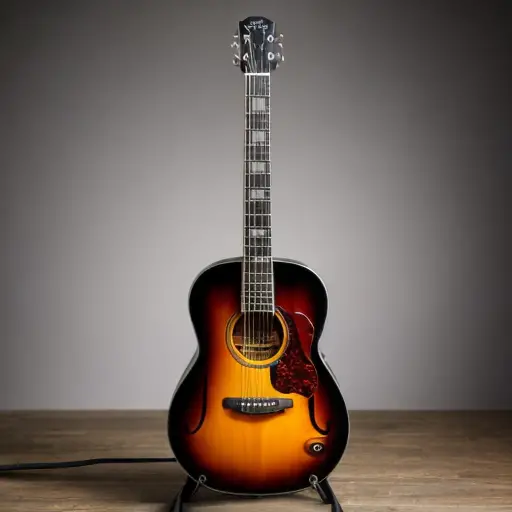Understanding Guitar Strings: A Comprehensive Buyer's Guide
Are you tired of strumming away on your trusty old guitar, only to discover that your strings snap more often than your patience during a traffic jam? Fear not, fellow music enthusiasts! I bring to you the ultimate guide to understanding guitar strings, so you can finally find the perfect match for your musical aspirations (and possibly prevent any future temper tantrums). From nylon to steel, light gauge to heavy gauge, this comprehensive buyer's guide has got you covered like a clingy groupie on a rock star's leg. So, grab your mug of coffee that's seen more late-night jam sessions than your neighbors would appreciate, and let's unravel the mysteries of guitar strings together! It's time to strum your way to string nirvana, my friends.
Choosing the Right Gauge: Factors to Consider for Optimal Sound
An interesting fact about how to buy guitar strings is that the gauge, or thickness, of the strings can greatly impact the tone and playability of the guitar. Thicker gauge strings generally produce a fuller, richer sound, while thinner gauge strings are known for their ease in bending and playing fast solos. Guitarists often experiment with different gauge combinations to achieve their desired sound and playability.
So, you've decided to dive into the world of guitar playing, huh? Well, brace yourself, because one of the most perplexing decisions you'll have to make is choosing the right gauge for your guitar strings. It's kind of like choosing a partner - you want to strike a balance between strength and flexibility (although, let's be honest, nobody wants a floppy string or a controlling one). Factors to consider include your playing style, musical genre, and even your own personal hand strength. Just remember, selecting the perfect gauge is like finding your soulmate in string form – you want a connection that resonates (literally) and makes your heart (and fingertips) sing. So, go forth, intrepid guitarists, and find that magical gauge that feels just right – because unlike dating, with guitar strings, you can always switch it up if things go sour.
Unraveling the Mysteries of Guitar String Materials: Which to Pick?

So you've finally decided to dive headfirst into the chaotic world of guitar playing, huh? Well, my dear aspiring musician, let me tell you, strumming those strings might seem like a piece of cake, but when it comes to choosing the right strings for your beloved instrument, things can get as confusing as trying to understand why socks have a talent for disappearing in the laundry.
Welcome to the perplexing world of guitar string materials, where every decision you make can either make you a guitar god or leave you sounding like a screeching cat with a severe case of hiccups. Now, let's unravel these string-related mysteries, shall we?
First off, we have the classic steel strings. Just like a solid pair of blue jeans, these strings are tough, sturdy, and built to withstand years of abuse from your reckless strumming. They are the go-to choice for many guitar players because of their bright sound and reliable durability. But hey, don't think it's all sunshine and rainbows. Steel strings can be a bit tough on those delicate fingers of yours, especially if you haven't built up calluses yet. So be prepared to endure a bit of finger pain in the beginning. Great sound comes at a price, my friend!
Now, let's step into the realm of nickel-plated steel strings. These babies are basically the fancy version of their plain steel cousins. Picture it like coasting down the highway in a sleek sports car instead of an old beat-up sedan. Nickel-plated steel strings offer a slightly warmer tone and a smoother feel, making them the perfect choice for those looking for that extra bit of comfort without sacrificing the sound quality. However, be warned that these strings can sometimes be a tad pricier than their plain steel counterparts, so you might have to be willing to cough up a few extra bucks for that luxury.
Alright, hold on to your hats because we're about to venture into uncharted territory with our next contestant – the phosphor bronze strings. Often associated with acoustic guitars, these strings are a favorite among those looking to add a touch of warmth and richness to their sound. Think of them as the equivalent of wrapping yourself in a cozy blanket by the fireplace on a chilly winter night. These strings are particularly popular among folk and country players who want to channel their inner campfire troubadour. But be warned, my friend, these strings have a mind of their own. They tend to darken over time, meaning that you might have to change them slightly more often than other types. Consider it a relationship – sometimes, you just have to let go and move on to find something new and exciting.
Last but certainly not least, let's talk about the vibrant world of nylon strings. Ah, yes, the soft touch and delicate sound of these strings can transport you to a serene tropical island, where worries vanish like old socks in the laundry. Nylon strings are ideal for classical guitars and offer a smooth feel for those tender-fingered folks out there. So, if you fancy yourself a classical virtuoso or if you just like to take the road less traveled, grab yourself a set of nylon strings and let them take you on a soothing musical journey.
Now my curious friend, armed with this newfound knowledge, go forth and conquer the vast realm of guitar string materials. Whether you opt for the rough and tough steel, the fancy and smooth nickel-plated steel, the warm and cozy phosphor bronze, or even the tranquil and delicate nylon, choose wisely and let your guitar strings be the manifestation of your true musical self. And remember, in the end, it's not just about picking the right guitar strings, but about finding the connection between your soul and those six magical strings. Happy strumming!
Tips for Purchasing and Maintaining Guitar Strings: From Brands to Longevity
Fun fact: Did you know that the world's longest guitar string was manufactured in 2003 and measured an astonishing 133.23 meters (437 feet) in length? Although you probably won't find strings that long at your local music store, it's fascinating to imagine the immense power and resonance it would produce if played on an equally enormous guitar!
So, you've decided to venture into the world of guitar playing, huh? Well, let me share some valuable insights on purchasing and maintaining guitar strings that are bound to make your life a little easier. First things first, when it comes to choosing a brand, remember this golden rule: go for the one with the coolest logo! Trust me, it'll make all the difference in how you look on stage. Secondly, longevity is key! If you want your strings to last longer, I suggest you refrain from using them as a cheese slicer or dental floss – they tend to wear out quickly that way. And finally, always keep a backup set of strings handy because nothing ruins a jam session faster than a sudden string snap. Believe me, your fellow bandmates will thank you for your preparedness. So, happy string shopping, my fellow music lovers! Rock on and don't forget to laugh at your own guitar fails along the way.


